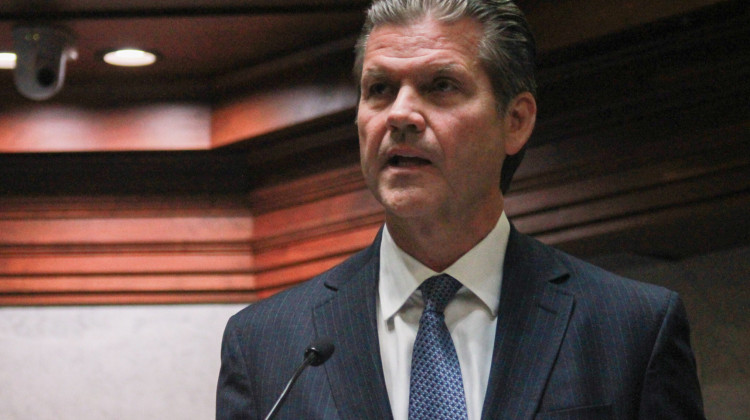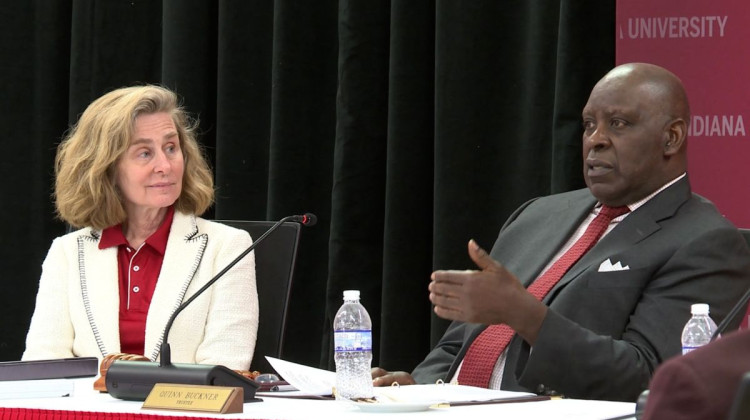
Providers say not every parent sees childcare as an investment in their child’s education, something they’re trying to change while they work to increase access for families.
Steve Burns/WTIUThree years ago, most of the kids at Perry Preschool and Childcare were just learning to use words and stand on two legs – others weren’t even alive yet. But some might have never ended up here in Tell City, if Perry Preschool and Childcare hadn’t opened its doors.
According to the Center For American Progress, just 12 percent of Indiana’s infants and toddlers have access to licensed preschool and childcare, but more businesses are starting to realize they need to prioritize childcare if they want to attract families and workers.
That’s what happened in Perry County. Erin Emerson, vice president of the Perry County Development Corporation played a key role in opening the center.
“Back in 2013 we met with our major employers,” she says. “A continual topic brought to the table by the employers was childcare and how it affected workforce.”
Emerson says in-home providers are essential to meet the demand of childcare needs, but the lack of a centralized center in the area meant it was tough for some families to find.
“There was a lot of in home, but no licensed facility – people were continually running into issues with lack of access,” she says.
So they formed a board of directors with county officials, community members and employers, and opened one in 2015.
Local businessman and dad, Brad Franzman, finds relief with the stability of Perry Preschool and Childcare’s (PPC) schedule and staff – he used to send his kids to an in-home provider. He’s also thrilled with the progress his son is showing.
“Our son, he’s going to be 4-years-old, and he’s really really learned a lot,” he says. “Just from speech from verbal to physical activity he’s grown leaps and bounds in two years that he’s been here.”
Other parents with kids at the center agree, and some say they might not have come to the area if it weren’t for PPC.
Advocates for better childcare and preschool access love to list the benefits of quality early learning classrooms like the ones at PPC, where curriculum and learning goals are a core part of everything they do.
Emerson says it was tough, finding the building and business model to make it work. But it wasn’t really the child-centered impact inspiring major progress here; tying it to workforce was what brought enough of the right people together.
“Had it just been about early childhood education, I think that no one could have denied the benefits,” she says. “But had it been something that an economic development organization would partner with and take such a role in? No.”
And plenty of hurdles in the industry mean that role is vital.
For one, licensing rules are thorough. They cover typical things like emergency plans and first aid, but also include detailed rules for food and meal planning, building features, equipment – which gets expensive, even before paying for another big cost: insurance.
How many children each room can hold at one time also depends on their ages and the number of adults, which means more staff, and more required training.
Pay isn’t very high for professionals in the field either. PPC Administrator Anna Seifert says not a single person on their payroll takes home more than $10 an hour, and some have student debt. Not to mention, the state’s licensing rules and voluntary Paths To Quality rating system mean people like Seifert need a degree of some kind.
“I know that if my husband didn’t have the job that he had, I couldn’t afford to do this job,” Seifert says.
PPC includes a traditional, and, an advanced preschool classroom, plus three rooms for toddlers and infants. The center serves kids from all over the county because it’s the only state licensed center for miles, with a few in-home providers nearby. There are nearly 80 kids who want a spot at PPC, but the facility can only take 56 at a time.
Perry County’s major employers have coughed up more than $200,000 to keep the center’s doors open. Still, Seifert says the unpredictable nature of some of the center’s costs and income combined with incredibly slim profits, mean finances are tight – and it’s hard to grow.
“We do everything that we do here on a day to day, cent by cent basis.” she says.
Access issues are getting more attention though, and more money could end up with early learning providers as Indiana focuses on the state’s workforce needs.
Indiana’s Family and Social Services Administration awards grants to some providers and families for childcare, and the state already offers a program to help low income families afford high quality preschool called On My Way Pre-K. It’s available in fewer than a quarter of Indiana’s counties, but providers in non-On My Way Pre-K counties can apply for capacity building grants.

A lot of lawmakers want to see On My Way Pre-K expand statewide, including to places like Perry County, but with limited state revenue it’s unlikely they’ll be able to do it in the upcoming session.
The state is also waiting to hear back on its application for a nearly $10 million federal grant that would help assess and address Indiana’s childcare needs, with a focus on information sharing and developing community-based systems.
Ultimately, advocates hope more minds – and funding – can improve Indiana’s limited access. But they also say one pretty common misconception about childcare needs to change too: even though they sing silly songs and play pretend, it’s more than just babysitting.
 DONATE
DONATE









 Support WFYI. We can't do it without you.
Support WFYI. We can't do it without you.